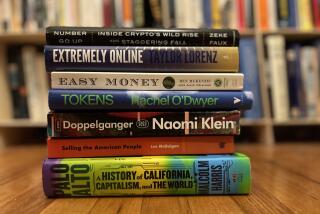BOOK REVIEW / NONFICTION : Lobbing a Few Verbal Grenades Into Cyberspace : WAR OF THE WORLDS: Cyberspace and the Hi-Tech Assault on Reality <i> by Mark Slouka</i> ; Basic Books $20, 208 pages
- Share via
Amid the endless hype and hoopla for cyberspace, the Internet and the information superhighway, here comes someone to say, “Hey, wait a minute! Is this what we want? Is this a good thing?” And his answer is a resounding and unqualified, “No! No! No!”
Mark Slouka, who teaches English and popular culture at UC San Diego, is neither interested in nor impressed by the blessings that computers are supposed to bring us. In fact, he’s downright frightened by what he sees, and he has no use for any of it.
So he has written a book to lay out his concerns.
On the one hand, we should thank him for challenging the conventional wisdom. On the other hand, “War of the Worlds” is so overwritten, so full of hyperbole, so extreme in its condemnation that it seriously weakens the good points the author makes.
Would you believe, for example, that he likens the cyberspace community to the Nazis at Nuremberg? The connection he sees is the loss of individuality as people surrender their identities into a group.
To make this argument, Slouka devotes a lot of space to quoting Kevin Kelly, the editor of Wired magazine, who claims that computer networks will create a worldwide consciousness. Slouka writes:
“Behind Kevin Kelly’s ultra-hip rhetoric, I hear the dull drone of 50,000 at Nuremberg, the buzz of excitement suddenly rising to a roar, then subsiding again like a wave. I see the excited yet uncomprehending faces, the young men in knee socks, like drones around the perimeter of the hive, bobbing up and down for a better look.”
As to the information superhighway, he says, “I, for one, would rather set up a good roadblock. Why do I say this? Because all the worst we’ve been--from the Mongol invasions to Majdanek to My Lai--we have been as groups, and because the human hive, as a concept, threatens to destroy the great counterforce to these periods of mass psychosis, namely, the individual’s ability to feel compassion, loyalty, and love for others.”
All this, remember, is allegedly the computer’s fault.
And that’s not the half of it.
In Slouka’s view, the computer is responsible for the increasing confusion of pictures with reality and of voyeurism with participation. We have lost touch with the world, he says. We have lost texture and context and nuance, the very things that make possible ethics and ethical behavior.
“Virtual systems,” he writes, “by offering us a reality divorced from the world, from the limits and responsibilities of presence, offer us as well a glimpse into an utterly amoral universe.”
These are not isolated quotes chosen out of context from this screed. Practically every page of the book contains howlers like these.
It’s too bad, because underneath it all Slouka has some serious things to say. He starts with a frontal assault (he apparently knows no other kind) on deconstructionism and the radical relativism that it leads to.
He argues that its basic insights are correct: There is no neutral place to stand. Everybody has a point of view. Written texts are frequently indeterminate.
But, he says, it does not follow that everything is meaningless, as many in the contemporary academy--and many others outside it, including many cyberspace boosters--would have us believe.
He also argues that the drumbeat on behalf of information, information and information never addresses the question--what do we need all this information for?
Slouka insists that he is no Luddite. He does not want to throw all of the computers into the ocean, even if that could be done. But he wants reality, not virtual reality. He is nostalgic for an earlier time.
“Old men don’t play horseshoes in cyberspace communities,” he says. “Teen-agers don’t make out under the bleachers. Kids can’t catch frogs or play stickball or jump in leaf piles. We can’t see each other smile or pass a bottle of wine.”
What is one to make of all this? Answer: Wait for a better book.
More to Read
Sign up for our Book Club newsletter
Get the latest news, events and more from the Los Angeles Times Book Club, and help us get L.A. reading and talking.
You may occasionally receive promotional content from the Los Angeles Times.










